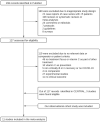Effect of Vitamin C on Clinical Outcomes of Critically Ill Patients With COVID-19: An Observational Study and Subsequent Meta-Analysis
- PMID: 35223911
- PMCID: PMC8873176
- DOI: 10.3389/fmed.2022.814587
Effect of Vitamin C on Clinical Outcomes of Critically Ill Patients With COVID-19: An Observational Study and Subsequent Meta-Analysis
Abstract
Background: Whether vitamin C provides any benefit when administered in critically ill patients, including those with coronavirus disease (COVID-19), is controversial. We endeavored to estimate the effect of administration of vitamin C on clinical outcomes of critically ill patients with COVID-19 by performing an observational study and subsequent meta-analysis.
Methods: Firstly, we conducted an observational study of critically ill patients with laboratory-confirmed COVID-19 who consecutively underwent invasive mechanical ventilation in an academic intensive care unit (ICU) during the second pandemic wave. We compared all-cause mortality of patients receiving vitamin C ("vitamin C" group) or not ("control" group) on top of standard-of-care. Subsequently, we systematically searched PubMed and CENTRAL for relevant studies, which reported on all-cause mortality (primary outcome) and/or morbidity of critically ill patients with COVID-19 receiving vitamin C or not treatment. Pooled risk ratio (RR) and 95% confidence intervals (CI) were calculated using a random effects model. The meta-analysis was registered with PROSPERO.
Results: In the observational study, baseline characteristics were comparable between the two groups. Mortality was 20.0% (2/10) in the vitamin C group vs. 47.6% (49/103; p = 0.11) in the control group. Subsequently, the meta-analysis included 11 studies (6 observational; five randomized controlled trials) enrolling 1,807 critically ill patients with COVID-19. Mortality of patients receiving vitamin C on top of standard-of-care was not lower than patients receiving standard-of-care alone (25.8 vs. 34.7%; RR 0.85, 95% CI 0.57-1.26; p = 0.42).
Conclusions: After combining results of our observational cohort with those of relevant studies into a meta-analysis of data from 1,807 patients, we found that administration vitamin C as opposed to standard-of-care alone might not be associated with lower of mortality among critically ill patients with COVID-19. Additional evidence is anticipated from relevant large randomized controlled trials which are currently underway.
Systematic review registration: https://www.crd.york.ac.uk/prospero/, identifier: CRD42021276655.
Keywords: acute respiratory distress syndrome; acute respiratory failure; coronavirus; intensive care unit; mechanical ventilation; pneumonia.
Copyright © 2022 Gavrielatou, Xourgia, Xixi, Mantelou, Ischaki, Kanavou, Zervakis, Routsi, Kotanidou and Siempos.
Conflict of interest statement
The authors declare that the research was conducted in the absence of any commercial or financial relationships that could be construed as a potential conflict of interest.
Figures


References
-
- Fowler AA, Truwit JD, Hite RD, Morris PE, DeWilde C, Priday A, et al. . Effect of vitamin C infusion on organ failure and biomarkers of inflammation and vascular injury in patients with sepsis and severe acute respiratory failure: the cITRIS-ALI randomized clinical trial. JAMA. (2019) 322:1261–70. 10.1001/jama.2019.11825 - DOI - PMC - PubMed
-
- Fujii T, Luethi N, Young PJ, Frei DR, Eastwood GM, French CJ, et al. . Effect of vitamin C, hydrocortisone, and thiamine vs hydrocortisone alone on time alive and free of vasopressor support among patients with septic shock: the VITAMINS randomized clinical trial. JAMA. (2020) 323:423–31. 10.1001/jama.2019.22176 - DOI - PMC - PubMed
-
- Sevransky JE, Rothman RE, Hager DN, Bernard GR, Brown SM, Buchman TG, et al. . Effect of vitamin C, thiamine, and hydrocortisone on ventilator- and vasopressor-free days in patients with sepsis: the VICTAS randomized clinical trial. JAMA. (2021) 325:742–50. 10.1001/jama.2020.24505 - DOI - PMC - PubMed
Publication types
LinkOut - more resources
Full Text Sources

